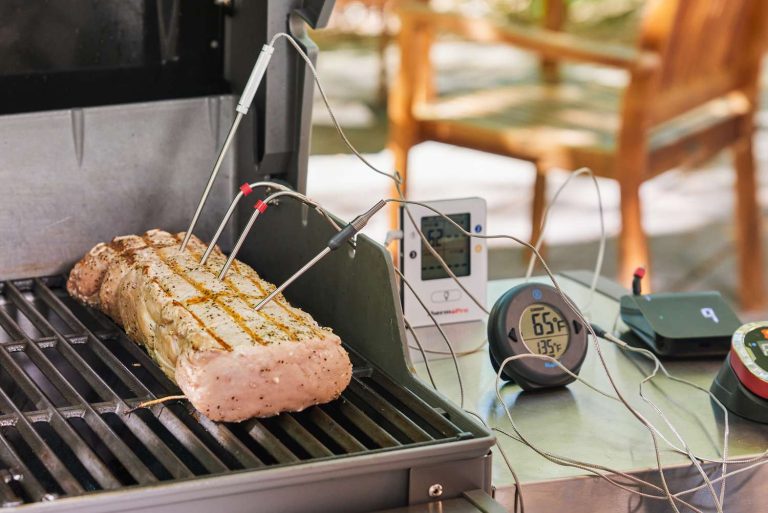When it comes to cooking the perfect steak or roast, having the right tools is essential. One of those tools is a meat thermometer, which ensures your culinary masterpiece is cooked just right.
But with so many options available, how do you decide between wireless and wired meat thermometers? This decision can make a big difference in your cooking experience and results. Imagine the convenience of monitoring your dish from across the room or the precision of a direct connection.
Each type has its unique benefits and drawbacks, and understanding these could revolutionize your time in the kitchen. Are you ready to discover which thermometer will become your trusty companion in culinary excellence? Let’s dive in and explore what each has to offer, so you can make the best choice for your cooking adventures.
Wireless Meat Thermometers
Choosing between wireless and wired meat thermometers depends on your cooking style. Wireless options offer flexibility and convenience, letting you monitor meat from afar. Wired thermometers, though, often provide more precise readings, ideal for those seeking accuracy in temperature tracking.
Are you tired of constantly running back and forth to check the temperature of your meat on the grill? Wireless meat thermometers offer a convenient solution that lets you monitor your cooking from a distance. These gadgets provide you with real-time updates, ensuring your meat is cooked to perfection without you being glued to the grill. ###Features And Benefits
Wireless meat thermometers come with a host of features designed to make your cooking experience easier and more enjoyable. They often include a digital display that shows the temperature in real-time, so you can easily see how your meat is doing. Some models even connect to your smartphone via Bluetooth or Wi-Fi, sending you alerts when your meat reaches the desired temperature. This allows you to multitask without the fear of overcooking or undercooking your food. Imagine hosting a BBQ party where you can socialize without being tied to the grill. With a wireless thermometer, you can enjoy your guests’ company while still keeping an eye on your food. ###Common Uses
Wireless meat thermometers are ideal for grilling, smoking, or even oven roasting. They are perfect for situations where you need to keep the grill lid closed to maintain heat. They’re also great for slow-cooking meats that require precise temperature control over several hours. Imagine cooking a brisket overnight without having to get up to check it; your wireless thermometer will let you know when it’s ready. Have you ever thought about how much easier your Thanksgiving dinner could be? With a wireless thermometer, you can monitor your turkey while focusing on other dishes, ensuring everything is ready at the same time. Do you find yourself constantly worrying about whether your meat is cooked just right? A wireless thermometer could be the tool that finally puts your mind at ease.
Credit: www.orka.tech
Wired Meat Thermometers
Wired meat thermometers offer accurate temperature readings without the need for batteries. They excel in providing consistent performance during cooking. Wireless models, in contrast, offer mobility and convenience but may require frequent charging.
When you’re cooking that perfect steak or roasting a holiday turkey, precision is key. Enter wired meat thermometers. These trusty kitchen companions have been around for years, helping cooks achieve culinary perfection. While they might seem old school compared to their wireless counterparts, wired thermometers offer reliability and accuracy that can’t be overlooked.Features And Benefits
Wired meat thermometers are known for their accuracy. The direct connection between the probe and the display ensures that you get real-time, precise temperature readings. They tend to be more affordable than wireless versions, making them a great option if you’re on a budget. With fewer components, they’re often easier to use and require less setup. Simply insert the probe into your meat, and you’re good to go. Wired thermometers are also battery-efficient. Without the need for wireless transmission, they consume less power, meaning fewer battery changes.Common Uses
Wired thermometers are perfect for oven cooking. You can easily run the wire through the oven door, ensuring continuous temperature monitoring without opening the oven. They’re ideal for smoking meats. When you’re smoking a brisket for hours, the consistent monitoring can help you maintain that tender texture. Use them for candy making too. Their reliability ensures that your sugar reaches the right temperature for the perfect consistency. Many home cooks prefer wired thermometers for everyday meal prep. The simplicity and accuracy make them a staple in many kitchens. Have you tried using a wired thermometer for your cooking? What was your experience? Share your thoughts in the comments below!Accuracy And Precision
Accuracy and precision are key factors when selecting meat thermometers. Ensuring meat is cooked to perfection requires reliable readings. Errors can lead to undercooked or overcooked meals. Both wireless and wired thermometers offer benefits, but their accuracy varies.
Temperature Consistency
Temperature consistency ensures your meat cooks evenly. Wired thermometers often provide stable readings due to direct contact. They are less likely to experience signal interference. Wireless thermometers may face challenges in maintaining consistent temperatures. Signals can be disrupted by walls or other electronic devices. This can lead to fluctuating readings.
Impact Of Device Type
Device type impacts thermometer precision. Wired thermometers offer direct measurement. Their sensors are usually embedded in the probe. This ensures immediate temperature feedback. Wireless thermometers rely on signal transmission. This may introduce slight delays in readings. Consider the environment where you cook. Wireless devices may face challenges in busy kitchens.

Credit: www.youtube.com
Ease Of Use
Choosing between wireless and wired meat thermometers can be tricky. Both types offer unique features. Ease of use is a major factor to consider. Understanding how simple they are to set up and operate is crucial. Let’s explore their ease of use.
Setup And Operation
Wired meat thermometers often require more setup time. You need to connect the probe to the main unit. Place the probe inside the meat and keep the unit nearby. Wireless models simplify the process. Just insert the probe and sync with a device. The wireless setup is often faster and more straightforward.
User Experience
Wired thermometers can limit movement in the kitchen. The cables can get tangled, creating inconvenience. Wireless models offer more freedom. You can move around while monitoring temperatures. Many wireless thermometers provide app connectivity. This feature enhances the user experience by offering remote monitoring.
Overall, the user experience varies. Wired thermometers are reliable but less flexible. Wireless models offer convenience and mobility. Choosing the right one depends on your cooking style and needs.
Durability And Lifespan
Choosing between wireless and wired meat thermometers often boils down to durability and lifespan. Understanding how build quality and maintenance affect these factors is essential. Each type has unique strengths and weaknesses. Let’s explore these aspects for both types of thermometers.
Build Quality
Wireless thermometers are designed with modern technology. They often include plastic and electronic components. These materials can be sensitive to heat and moisture. Wired thermometers usually feature sturdy metal probes. Metal is less prone to damage from heat. The wire itself can be vulnerable to wear over time. This difference impacts overall lifespan.
Maintenance Requirements
Wireless meat thermometers require careful handling. You must protect the electronic parts from damage. Regular cleaning is crucial to avoid dirt buildup. Wired thermometers need less maintenance. Their simpler design means fewer parts to clean. Keeping wires untangled helps extend their life. Both types need occasional checks for accuracy.
:max_bytes(150000):strip_icc()/sea-detail-meater-plus-meat-thermometer-rkilgore-0004-6042c65fbb764ae597aede3ef2ca3447.jpeg)
Credit: www.seriouseats.com
Price And Value
Choosing between wireless and wired meat thermometers can be tricky. Price and value play a crucial role in the decision. Understanding cost differences helps you make a wise choice. Additionally, considering the long-term benefits is vital.
Cost Comparison
Wireless meat thermometers often cost more. They offer advanced features and convenience. Wired thermometers are usually cheaper. They provide reliable readings without extra frills. Consider your budget and needs before deciding. Wireless options might seem pricey upfront. But their added features can enhance your cooking experience.
Long-term Investment
Think about the long-term benefits. Wireless thermometers often last longer. They offer flexibility and ease of use. Wired thermometers are durable but may require replacements. Investing in quality can save money over time. Wireless models might offer future-proof technology. They adapt well to new cooking trends. Wired ones might stick to basic functions. Consider how often you cook and your tech preferences.
Best For Different Cooking Styles
Wireless and wired meat thermometers cater to various cooking styles. Wireless models offer flexibility for outdoor grilling. Wired ones provide precision for indoor roasting. Choose based on your cooking needs.
Choosing between wireless and wired meat thermometers can be tricky, especially when considering different cooking styles. Each type has its strengths, making one a better fit for certain culinary tasks. Let’s explore how each thermometer serves you best, depending on your cooking style.Grilling And Barbecuing
When you’re grilling or barbecuing, moving around is part of the fun. A wireless meat thermometer can be your best friend here. Imagine enjoying a cold drink with friends while keeping an eye on your steak’s temperature from your smartphone. Wireless thermometers let you monitor the heat without hovering over the grill. You can adjust the cooking process from afar. No more running back and forth to check if the meat is done. I once hosted a barbecue and used a wireless thermometer. The freedom it offered was a game-changer, allowing me to socialize without sacrificing the perfect grill. How often do you get to relax while cooking?Oven And Slow Cooking
Oven and slow cooking demand precision and patience. Here, wired meat thermometers shine. They provide consistent, real-time data, essential when cooking roasts or stews. Wired thermometers often withstand higher temperatures and offer more accurate readings. This reliability is crucial when you’re slow-cooking a brisket for several hours. You want to trust your thermometer to alert you at the exact moment your dish is ready. In my kitchen, a wired thermometer is my go-to for slow-cooked meals. It never fails to provide accurate data, ensuring perfect results every time. What’s more satisfying than knowing your roast will turn out just right? Choosing the right thermometer depends on your cooking style and needs. Do you prefer the freedom of wireless or the reliability of wired? Your choice can enhance your culinary adventures, making every meal a success.Pros And Cons
When deciding between wireless and wired meat thermometers, weighing the pros and cons can guide your choice. Each type offers unique advantages and drawbacks that cater to different cooking styles and environments. Your decision might depend on how much freedom you want during cooking or how much you value precision.
Advantages Of Wireless
Wireless meat thermometers offer unmatched convenience. Imagine hosting a barbecue while monitoring your brisket’s temperature from the comfort of your living room. That’s the beauty of wireless technology.
These thermometers are great for multitasking. You can easily attend to guests or handle other cooking tasks without being chained to the grill. They often come with smartphone apps, allowing real-time updates and alerts.
Freedom from wires means less clutter and more mobility. For outdoor cooking adventures, this is a game changer. You can roam around your backyard without losing connection to your cooking masterpiece.
Advantages Of Wired
Wired meat thermometers are champions of reliability. They provide consistent and accurate readings, making them ideal for precision cooking. You never have to worry about losing signal or battery life.
These thermometers are generally more affordable. If you’re budget-conscious, a wired model might be your best bet without sacrificing performance.
Many chefs swear by the tried-and-true reliability of wired thermometers. If you prefer simplicity and guaranteed results, wired might be the way to go.
Drawbacks Of Each Type
Wireless thermometers can sometimes suffer from connectivity issues. Imagine losing your signal right in the middle of cooking a perfect steak. It’s frustrating and could impact your meal.
Battery life can be a concern with wireless models. The last thing you want is your thermometer dying during a long smoke session.
Wired thermometers, while reliable, can be limiting. The tethered design restricts movement, and wires can become tangled or cumbersome.
Have you ever tripped over a wire while checking your roast? It happens, and it’s annoying. This lack of mobility can be a dealbreaker for some.
Both types have their unique challenges. Your choice might depend on how much you value freedom versus reliability. What suits your cooking style and environment best?
Consumer Preferences
Choosing between wireless and wired meat thermometers depends on convenience and accuracy. Wireless thermometers offer mobility, allowing easy monitoring from a distance. Wired versions tend to provide precise readings, ensuring perfectly cooked meat every time.
Understanding consumer preferences is crucial when choosing between wireless and wired meat thermometers. Some people love the convenience of wireless options, while others swear by the reliability of wired versions. Your choice might depend on your cooking style, tech comfort level, or even your kitchen layout. ###Survey Insights
A recent survey revealed interesting insights into consumer preferences. Over 60% of respondents preferred wireless meat thermometers due to their ease of use and flexibility. Imagine being able to monitor your roast while relaxing in your living room—sounds appealing, right? However, about 40% still choose wired thermometers. They value the consistent accuracy that comes without battery concerns. Have you ever experienced a wireless device losing connection at the worst possible time? ###Market Trends
The market is responding to these preferences with innovative products. Sales of wireless thermometers have surged by 30% in the past year. This trend is fueled by tech-savvy consumers who enjoy integrating smart gadgets into their cooking routines. Yet, wired thermometers are not left behind. Manufacturers are enhancing their durability and precision, appealing to traditionalists and professional chefs. Would you trust your Thanksgiving turkey to a device that might fail just when you need it most? While the debate continues, your choice ultimately reflects your cooking priorities. Do you prioritize convenience and freedom, or is precision your main concern?Frequently Asked Questions
Are Wireless Meat Thermometers Worth It?
Wireless meat thermometers offer convenience and precision for cooking. They help ensure perfect meat temperatures without constant checking. Ideal for grilling or roasting, they enhance cooking efficiency. Investing in one saves time and reduces guesswork, making it worthwhile for frequent cooks or BBQ enthusiasts.
What Is The Difference Between Wired And Wireless Meat Thermometers?
Wired meat thermometers require a cable to connect the probe and display. Wireless thermometers transmit data remotely, offering greater flexibility.
What Type Of Meat Thermometer Is Most Accurate?
Digital instant-read thermometers are the most accurate. They provide quick, precise readings of meat temperatures. Choose models with thin probes for efficiency. Ensure your thermometer has calibration features for long-term accuracy. Digital options are user-friendly and reliable, perfect for achieving ideal cooking results.
Should I Get Analog Or Digital Meat Thermometer?
Choose an analog meat thermometer for simplicity and durability. Opt for a digital one for precision, speed, and advanced features. Consider your cooking style and preference to decide which suits you best. Both types have their advantages, so pick the one that aligns with your needs.
Conclusion
Choosing between wireless and wired meat thermometers depends on your needs. Wireless thermometers offer convenience and flexibility. You can monitor meat from a distance. Wired thermometers provide consistent accuracy. They are reliable for traditional cooking methods. Each type has its advantages.
Consider your cooking style and preferences. Think about the features that matter to you. Whether it’s ease of use or precision. Both types can enhance your cooking experience. Make an informed decision. Enjoy perfectly cooked meals every time. Your choice will reflect your cooking style best.


